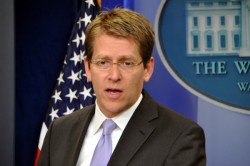National
Obama still evolving on marriage
President refers to married gay couples in HRC speech

White House Press Secretary Jay Carney said Monday that President Obama continues to evolve on same-sex marriage.
Under questioning from the Washington Blade, Carney confirmed Obama remains in a state of evolution on the issue after he first said his views could change on the issue in October 2010.
“I don’t have an update for you on his position,” Carney said. “The remarks he made last year stand and I just don’t have anything new to add to that.”
Asked when this evolution might conclude, Carney repeated he doesn’t have “anything new.”
Obama first suggested his views on the issue could evolve in October 2010 during an interview with AMERICAblog’s Joe Sudbay. Some advocates have been pushing him to complete this evolution and publicly endorse same-sex marriage.
In 1996, Obama, during his bid to become an Illinois state senator, said in a questionnaire response to the Windy City Times, “I favor legalizing same-sex marriages, and would fight efforts to prohibit such marriages.”
On Saturday, questions emerged over whether Obama had come to support marriage equality when he gave the keynote speech at the 15th annual Human Rights Campaign National Dinner. The president made references to the enactment of same-sex marriage rights in New York as well as to the spouses of gay Americans without making an explicit endorsement of marriage equality.
At one point, when talking about progress, Obama said, “It happens when a father realizes he doesn’t just love her daughter, but also her wife.”
Carney dismissed any interpretation of those remarks as a hint that Obama now supports same-sex marriage.
“I would say that you’re over-interpreting remarks,” Carney said. “The president’s position on gay marriage is well known. The comments he made late last year about his views on it are well known, and I have no updates for you. I wouldn’t read into language there any change.”
Asked whether Obama’s comments referring to married gay couples at the dinner were disingenuous, Carney replied, “I think this president’s record on LGBT issues, his commitment to the rights of all Americans was evident on Saturday night both in his remarks and the response he got from the audience there, so I’ll leave it at that.”
Later on Monday, President Obama confirmed in an interview with ABC News’ George Stephanopoulos that he’s “still working” on his views on same-sex marriage.
According to the Associated Press, Obama said gay couples should at a minimum have strong civil unions, but he stopped short of backing marriage equality. Obama was quoted as saying friends, family and children of same-sex couples whom he knows who are thriving are influencing his evolving views.
A brief transcript of the exchange between the Blade and Carney follows:
Washington Blade: Jay, I’d like some clarification on some things the president said on Saturday during a speech before an LGBT audience at the Human Rights Campaign dinner.
When he was talking about the American Jobs Act, the president said, “You’re also folks who are worried about the economy and whether or not your partner or husband or wife will be able to find a job.” Later on, when talking about progress, he said, “It happens when a father realizes he doesn’t just love her daughter, but also her wife.”
Should I interpret those remarks to mean the president now supports same-sex marriage?
Jay Carney: I would say that you’re over-interpreting remarks. I would just leave it to you to analyze. The president’s position on gay marriage is well known. The comments he made late last year about his views on it are well known, and I have no updates for you. I wouldn’t read into language there any change.
Blade: But isn’t it disingenuous for the president to speak reverentially about these people’s spouses when he doesn’t support same-sex marriage?
Carney: Again, I’ll let the president address that question. I think this president’s record on LGBT issues, his commitment to the rights of all Americans was evident on Saturday night both in his remarks and the response he got from the audience there, so I’ll leave it at that.
Blade: We’re approaching the one-year anniversary when the president first said he could evolve on same-sex marriage. He said that late in October 2010 in an interview with progressive bloggers. Has that evolution been shelved or is it still on the table?
Carney: Again, I think I just answered that question. I don’t have an update for you on his position. The remarks he made last year stand and I just don’t have anything new to add to that.
Blade: But when will the evolution come to an end?
Carney: Again, I don’t have anything new to add to that.
Watch the video here (via Think Progress):
http://www.youtube.com/watch?v=MZXjWVdotl8&feature=player_embedded
New York
Two teens shot steps from Stonewall Inn after NYC Pride parade
One of the victims remains in critical condition

On Sunday night, following the annual NYC Pride March, two girls were shot in Sheridan Square, feet away from the historic Stonewall Inn.
According to an NYPD report, the two girls, aged 16 and 17, were shot around 10:15 p.m. as Pride festivities began to wind down. The 16-year-old was struck in the head and, according to police sources, is said to be in critical condition, while the 17-year-old was said to be in stable condition.
The Washington Blade confirmed with the NYPD the details from the police reports and learned no arrests had been made as of noon Monday.
The shooting took place in the Greenwich Village neighborhood of Manhattan, mere feet away from the most famous gay bar in the city — if not the world — the Stonewall Inn. Earlier that day, hundreds of thousands of people marched down Christopher Street to celebrate 55 years of LGBTQ people standing up for their rights.
In June 1969, after police raided the Stonewall Inn, members of the LGBTQ community pushed back, sparking what became known as the Stonewall riots. Over the course of two days, LGBTQ New Yorkers protested the discriminatory policing of queer spaces across the city and mobilized to speak out — and throw bottles if need be — at officers attempting to suppress their existence.
The following year, LGBTQ people returned to the Stonewall Inn and marched through the same streets where queer New Yorkers had been arrested, marking the first “Gay Pride March” in history and declaring that LGBTQ people were not going anywhere.
New York State Assemblywoman Deborah Glick, whose district includes Greenwich Village, took to social media to comment on the shooting.
“After decades of peaceful Pride celebrations — this year gun fire and two people shot near the Stonewall Inn is a reminder that gun violence is everywhere,” the lesbian lawmaker said on X. “Guns are a problem despite the NRA BS.”
New York
Zohran Mamdani participates in NYC Pride parade
Mayoral candidate has detailed LGBTQ rights platform

Zohran Mamdani, the candidate for mayor of New York City who pulled a surprise victory in the primary contest last week, walked in the city’s Pride parade on Sunday.
The Democratic Socialist and New York State Assembly member published photos on social media with New York Attorney General Letitia James, telling followers it was “a joy to march in NYC Pride with the people’s champ” and to “see so many friends on this gorgeous day.”
“Happy Pride NYC,” he wrote, adding a rainbow emoji.
Mamdani’s platform includes a detailed plan for LGBTQ people who “across the United States are facing an increasingly hostile political environment.”
His campaign website explains: “New York City must be a refuge for LGBTQIA+ people, but private institutions in our own city have already started capitulating to Trump’s assault on trans rights.
“Meanwhile, the cost of living crisis confronting working class people across the city hits the LGBTQIA+ community particularly hard, with higher rates of unemployment and homelessness than the rest of the city.”
“The Mamdani administration will protect LGBTQIA+ New Yorkers by expanding and protecting gender-affirming care citywide, making NYC an LGBTQIA+ sanctuary city, and creating the Office of LGBTQIA+ Affairs.”
U.S. Supreme Court
Supreme Court upholds ACA rule that makes PrEP, other preventative care free
Liberal justices joined three conservatives in majority opinion

The U.S. Supreme Court on Friday upheld a portion of the Affordable Care Act requiring private health insurers to cover the cost of preventative care including PrEP, which significantly reduces the risk of transmitting HIV.
Conservative Justice Brett Kavanaugh authored the majority opinion in the case, Kennedy v. Braidwood Management. He was joined by two conservatives, Chief Justice John Roberts and Justice Amy Coney Barrett, along with the three liberal justices, Sonia Sotomayor, Elena Kagan, and Ketanji Brown-Jackson.
The court’s decision rejected the plaintiffs’ challenge to the Affordable Care Act’s reliance on the U.S. Preventative Services Task Force to “unilaterally” determine which types of care and services must be covered by payors without cost-sharing.
An independent all-volunteer panel of nationally recognized experts in prevention and primary care, the 16 task force members are selected by the secretary of the U.S. Department of Health and Human Services to serve four-year terms.
They are responsible for evaluating the efficacy of counseling, screenings for diseases like cancer and diabetes, and preventative medicines — like Truvada for PrEP, drugs to reduce heart disease and strokes, and eye ointment for newborns to prevent infections.
Parties bringing the challenge objected especially to the mandatory coverage of PrEP, with some arguing the drugs would “encourage and facilitate homosexual behavior” against their religious beliefs.
-

 U.S. Supreme Court4 days ago
U.S. Supreme Court4 days agoSupreme Court upholds ACA rule that makes PrEP, other preventative care free
-

 U.S. Supreme Court4 days ago
U.S. Supreme Court4 days agoSupreme Court rules parents must have option to opt children out of LGBTQ-specific lessons
-

 National5 days ago
National5 days agoEvan Wolfson on the 10-year legacy of marriage equality
-

 Congress5 days ago
Congress5 days agoSenate parliamentarian orders removal of gender-affirming care ban from GOP reconciliation bill











